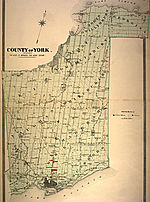David Dunlap Observatory

The David Dunlap Observatory (DDO) is an astronomical observatory site in Richmond Hill, Ontario, Canada. Established in 1935, it was owned and operated by the University of Toronto until 2008. It was then acquired by the city of Richmond Hill, which provides a combination of heritage preservation, unique recreation opportunities and a celebration of the astronomical history of the site. Its primary instrument is a 74-inch (1.88 m) reflector telescope, at one time the second-largest telescope in the world, and still the largest in Canada. Several other telescopes are also located at the site, which formerly also included a small radio telescope. The scientific legacy of the David Dunlap Observatory continues in the Dunlap Institute for Astronomy & Astrophysics, a research institute at the University of Toronto established in 2008. The DDO is the site of a number of important scientific studies, including pioneering measurements of the distance to globular clusters, providing the first direct evidence that Cygnus X-1 was a black hole, and the discovery that Polaris was stabilizing and appeared to be "falling out" of the Cepheid variable category. Located on a hill, yet still relatively close to sea level at 730 feet (220 m) altitude, and now surrounded by urban settlement, its optical astronomy ability has been reduced as compared to other remote observatory sites around the world. On 31 July 2019, the DDO was accepted by the National Historic Board as a National Historic Site of Canada.
Excerpt from the Wikipedia article David Dunlap Observatory (License: CC BY-SA 3.0, Authors, Images).David Dunlap Observatory
Astronomer Court, Richmond Hill
Geographical coordinates (GPS) Address Nearby Places Show on map
Geographical coordinates (GPS)
| Latitude | Longitude |
|---|---|
| N 43.8629 ° | E -79.4227 ° |
Address
Astronomer Court
L4C 0A6 Richmond Hill
Ontario, Canada
Open on Google Maps







